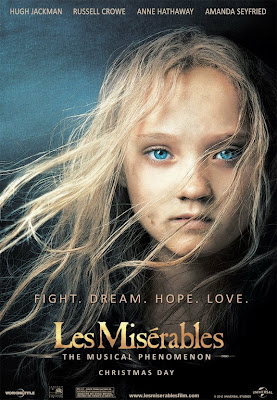Les Misérables
Cadillac Palace Theatre
Thru October 29
What can I say about Les Misérables, the musical, that I haven't said before?
With deference to others that could be in the team photo-- West Side Story, My Fair Lady, Cabaret, Fiddler on the Roof, Hamilton and even my personal favorite, The Producers--I believe Les Miz is the be the greatest work of musical theater ever created.
The story, based on the classic novel by Victor Hugo (I've never read it), is first-rate and the songs composed by Claude-Michel Schönberg with lyrics by Herbert Kretzmer-- based on the original French lyrics by Alain Boublil and Jean-Marc Natel--are truly sublime.
Seeing Les Misérables live for the 12th time the other night--I'm also a fan of the 2012 film--I was amazed anew at how well Kretzmer's lyrics work, all the more amazing given that his words had to match the meter of the French lyrics.
Although my first viewing of the musical--on Broadway in 1998--came a decade after it could have, I've been fortunate to see Les Miz in a variety of locales at a variety of levels.
This includes in London (where the original production has been running for 32 years), six times on national tours through Chicago--representing the original Broadway production and newer renditions, as is now the case--and at regional theaters across Chicagoland (Marriott Lincolnshire, Drury Lane Oakbrook, Paramount Aurora), where the production values have remained superb.
I've even seen an excellent high school production.
So I clearly love Les Misérables, enough that it feels fresh each time I see it.
Although this touring production, drawn from the 2014 Broadway revival, lacks a few of the original touches--most notably, the famed stage turntable--it is nonetheless one of the larger-scale touring shows you'll see nowadays.
And especially due to sublime vocal performances, but also some nicely re-imagined staging--I particularly liked the way "Empty Chairs at Empty Tables" is now handled--it is fantastic.
The quality was so strong that annoying patrons nearby--you really needn't read the program at the start of every song, especially if it means shining light upon it or holding it up in front of your face (and mine), and if you can't stop coughing, perhaps step out for some water or a lemon drop--couldn't diminish my delight.
Much.
This appears to be a full Equity tour--see Chris Jones' Tribune story on actors' pay in the production--and while none of the cast members names were familiar to me, everyone is terrific. Particularly in the key roles.
As Jean Valjean--who begins the show as prisoner 24601--Nick Cartell seems younger and less physically robust than many I've seen, but not to any consequence. And his voice, as displayed on "Who Am I?" and "Bring Him Home" is splendid.
Part of makes Les Misérables so great is the combination of rousing group numbers--"At the End of the Day," "Master of the House," "ABC Cafe" (i.e. Red and Black), "The People's Song," "One Day More"--and beautiful solo songs.
Here, even way up into the balcony, the former were tremendously powerful, with nice work done by J. Anthony Crane and Allison Gunn as the Thenadiers and Matt Shingledecker as Enjolras.
And all the individual numbers came off as well as I could have wanted (and I know every note and lyric from the cast recordings, videos and previous live viewings).
 So kudos to Melissa Mitchell (as Fantine) on "I Dreamed a Dream," Zoe Glick (Young Cosette) on "Castle on a Cloud," Josh Davis (a quite fine Javert) on a sublime "Stars," Phoenix Best (Eponine) on "On My Own," Cartell as Valjean on "Bring Him Home," Joshua Grosso (Marius) on "Empty Chairs at Empty Tables" and also Jillian Butler as Cosette, who charms on "In My Life" and "A Heart Full of Love," though these aren't technically solo numbers.
So kudos to Melissa Mitchell (as Fantine) on "I Dreamed a Dream," Zoe Glick (Young Cosette) on "Castle on a Cloud," Josh Davis (a quite fine Javert) on a sublime "Stars," Phoenix Best (Eponine) on "On My Own," Cartell as Valjean on "Bring Him Home," Joshua Grosso (Marius) on "Empty Chairs at Empty Tables" and also Jillian Butler as Cosette, who charms on "In My Life" and "A Heart Full of Love," though these aren't technically solo numbers.So I really don't have much new to say about this rendition of Les Misérables other than to call it a remarkable rendering.
Given how often I've seen Les Miz, its inclusion in my Broadway in Chicago subscription season wasn't a source of intense focus.
Until last week, I worried that my scheduled performance might conflict with Game 1 of the World Series. (It did, but my beloved Cubs didn't quite make it again.)
 Hence, I really wasn't much locked into seeing the show until I sat in my seat.
Hence, I really wasn't much locked into seeing the show until I sat in my seat.And Les Misérables once again just blew me away.
That's how good it is.
Still.
I don't consider it hyperbole to call it one of the greatest works of creative
artistry ever produced.
So if you can get a ticket before it closes in Chicago this Sunday--or catch it elsewhere--by all means, go hear the people sing.



















